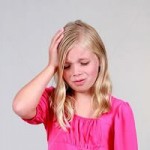Symptoms Of Migraine In Children
 Migraine is a headache but it is a severe version of it. It is accompanied by nausea, vomiting and vision disturbances. It may be genetic and, though it affects both genders, girls suffer for many more years as they undergo many hormonal changes during puberty. During a migraine attack blood vessels constrict and then expand, causing throbbing and pain.
Migraine is a headache but it is a severe version of it. It is accompanied by nausea, vomiting and vision disturbances. It may be genetic and, though it affects both genders, girls suffer for many more years as they undergo many hormonal changes during puberty. During a migraine attack blood vessels constrict and then expand, causing throbbing and pain.
There are four phases in a migraine a feeling that something is amiss, may begin even twenty four hours before the attack. The child may become irritable and either may lose his appetite or may eat more than usual. His body may bloat due to water retention and may experience problems in sleeping. Some children do not feel like talking while others may become talkative. Each child may exhibit different symptoms but they will be an aberration from what is normal for that child.
The second phase may begin just half an hour before the migraine. There may be flashes of light or dots dancing in front of the eyes. The child may complain of vertigo and appear confused. He may not have full control over his muscles. The actual headache phase may last for three to four hours. The child will feel cold, nauseated and want to lie down in a darkened room. He may be struck by diarrhoea and in extreme cases have memory loss. The pain may be on one side of the head in older children, and on both sides in younger ones. After the attack is over the child will be happy but exhausted and this fourth phase may last for a few days.
Migraine attacks last for a shorter duration in children than in adults and do not fall in the category of serious illness. However, the pain is very great while it lasts, upsetting normal routine, and there is no telling when an attack will strike. The only relief is that children remain symptom free in between attacks.
Certain foods can trigger a migraine, the major culprits being chocolate, some nuts, sugar, cheese and caffeine. Anxiety and stress levels also play a major part in bringing about an attack. Not having sufficient sleep is another invitation for a migraine. Parents should try to identify what brings about an attack on their child so that prevention becomes easier.
Doctors suggest that these children should be given nutritious meals and a proper regimen should be followed in regard to their rest and sleep. Save the child from undue anxiety both in school and at home. Ask the child to rest as soon as he complains of any symptoms as sleep is the best cure. Give the child a painkiller to tide over the attack.